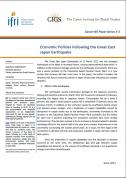Prospects for 6-party talks: Nuclear weapons are a means of survival for Kim Jung Un

The most imperative duty of the third-generation Kim Jong Un is the “survival” of North Korea. This will require not only a smooth transfer of power from his father but also shoring up the national economy. This is because I feel the current regime will sooner or later come to the end of its tether unless North Korean economy breaks free of foreign dependence and begins to grow autonomously.
In May 2011 I had the opportunity to visit the capital Pyongyang and its environs. The North Korean economy I saw there was truly miserable. In farming villages, although rice planting had already begun I hardly saw any equipment such as tractors or rice planting machines.
I realized then that there would be no tomorrow for North Korean agriculture still done entirely with manual labor. What’s more, the people’s economic grievances will likely grow as the heredity of power reaches a third generation. The mourning period aside, even Kim Jong Un, for his part, will eventually have to improve the national economic system and build a society capable of reproduction.
The bottom line is that it is not only a matter of Kim Jong Un surviving as the third generation of the “Kim Dynasty” but also the fact that he has been left with the extremely difficult task of giving the “Democratic People’s Republic of Korea” system a chance to survive in the mournful years to come.

Available in:
Regions and themes
Share
Download the full analysis
This page contains only a summary of our work. If you would like to have access to all the information from our research on the subject, you can download the full version in PDF format.
Prospects for 6-party talks: Nuclear weapons are a means of survival for Kim Jung Un
Related centers and programs
Discover our other research centers and programsFind out more
Discover all our analyses
China’s Strategy Toward Pacific Island countries: Countering Taiwan and Western Influence
Over the past decade, China has deployed a diplomatic strategy toward the Pacific Island Countries (PICs). This strategy pursues two main objectives: countering Taiwan's diplomatic influence in the region and countering the influence of liberal democracies in what Beijing refers to as the "Global South."

Opening up the G7 to South Korea to Address Contemporary Global Challenges
The G7’s global influence has diminished as powers like China reshape international governance through initiatives such as BRICS and the Shanghai Cooperation Organisation (SCO). With the G7 now representing just 10 per cent of the world’s population and 28 per cent of global GDP, its relevance is increasingly questioned.
Expanding SPDMM as a pivotal institution in the Pacific – A French perspective
The South Pacific Defence Ministers’ Meeting (SPDMM) is the only forum that brings together defense ministers from the wider South Pacific — including Chile, which is hosting it for the first time. This heterogeneous group of countries with varying resources, capacities, and interests — Australia, Chile, Fiji, France, New Zealand, Papua New Guinea (PNG), and Tonga — are united by their shared determination to strengthen cooperation on maritime security and humanitarian assistance and disaster relief (HADR) activities.
EU’s Derisking From China: A Daunting Task
With economic security as a major concern, the EU has recently turned to “derisking” from China. The EU strategy entails reducing critical dependencies and vulnerabilities, including in EU supply chains, and diversifying where necessary, while recognizing the importance and need to maintain open channels of communication.







